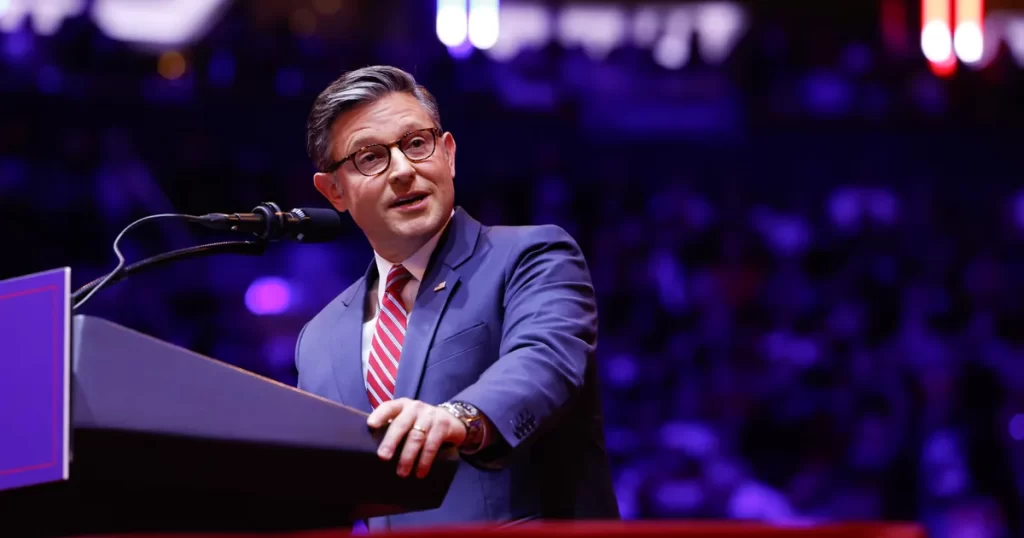Johnson vows health care overhaul if Republicans win: ‘No Obamacare’
3 min read
The Speaker speaks. Photo: Anna Moneymaker/Getty Images

The Speaker speaks. Photo: Anna Moneymaker/Getty Images
House Speaker Mike Johnson declared on Monday night that if Republicans reclaim the White House, they will pursue significant changes to the Affordable Care Act (ACA), commonly known as Obamacare. This pledge was made during a campaign event in Pennsylvania, signaling a key component of the GOP’s legislative agenda for the upcoming year.
Speaking at a GOP rally in Bethlehem, Pennsylvania, Johnson emphasized that reforming the 14-year-old health care law would be a priority in the first 100 days of a Republican administration. His remarks came amid a push to rally support for GOP candidate Ryan Mackenzie, who is challenging Democratic Rep. Susan Wild in a critical swing district.
At the event, an audience member directly asked, “No Obamacare?” Johnson, dressed in a customized Trump-Vance jacket, replied affirmatively, stating, “No Obamacare.” This moment encapsulated the GOP’s ongoing opposition to the health care law, which has been a consistent target for the party since its inception.
Johnson’s commitment to overhauling Obamacare arrives at a crucial time, as both parties are making their final appeals to voters. Notably, his remarks come after Republicans struggled to dismantle significant portions of the ACA during Donald Trump’s first term. Despite having full control of Congress in 2017, GOP efforts to repeal the law were thwarted by then-Senator John McCain, who opposed the repeal due to the lack of a clear replacement plan.
At the rally, Johnson asserted, “Health care reform is going to be a big part of the agenda,” indicating a renewed focus on the issue. This was his third visit to the Lehigh Valley as part of his efforts to galvanize support for Republican candidates in the region.
While Republican leaders have shifted their focus to other legislative priorities since the failed repeal efforts, Johnson made it clear that the ACA remains a target. “The ACA is so deeply ingrained; we need massive reform to make this work. And we’ve got a lot of ideas on how to do that,” he said, although he did not provide specific details about the proposed reforms.
The GOP Doctors Caucus, a group of Republican physicians in the House, has been working on legislative proposals related to health care reform. Johnson suggested that the party’s plans would extend beyond health care, as he noted the need for broad “free market” reforms across various sectors.
Highlighting the urgency of the GOP agenda, Johnson remarked, “Trump’s gonna go big. I mean, he’s only gonna have one more term, right?” This statement reflects a belief that if Trump is reelected, he would prioritize significant legislative initiatives during his second term.
House Minority Leader Hakeem Jeffries, the top Democrat in the House, quickly responded to Johnson’s comments during his own campaign events in Michigan. He emphasized the GOP’s intentions, stating, “Just yesterday, the top Republican in the House said one of the first things they’ll do is repeal and get rid of the Affordable Care Act as we know it. This is still on their mind.”
Despite Johnson’s bold assertions, health care has not emerged as a central theme in the 2024 election campaign, partly due to the ACA’s enduring popularity, especially regarding protections for individuals with pre-existing conditions. The political landscape has also shifted, as Republicans have primarily focused on marginal changes to the law, while the Supreme Court has repeatedly upheld its key provisions.
In a departure from previous statements, Trump has recently reassured voters that he does not intend to eliminate the ACA. In a video shared on Truth Social in April, he stated, “I’m not running to terminate the ACA.” Instead, he promised to enhance it, saying, “We’re going to make it much better, much stronger.”
Meanwhile, Democratic presidential nominee Kamala Harris has been warning voters in a recent ad campaign that losing the protections afforded by Obamacare could be at risk if Trump is reelected.
Johnson’s remarks were initially reported by NBC News and underscore the ongoing debate over health care as a critical issue in American politics. As the election approaches, both parties will continue to outline their visions for the future of health care in the United States.